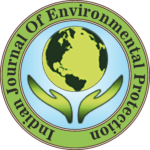IJEP 43(7): 622-628 : Vol. 43 Issue. 7 (July 2023)
Huda Jamal Jumaah1*, Akram Khalaf Mohammed2, Mohammed Hashim Ameen2 and Sarah Jamal Jumaah3
1. Northern Technical University, Environment and Pollution Engineering Department, Technical Engineering College Kirkuk, Kirkuk 36001, Iraq
2. Tikrit University, Environmental Engineering Department, Engineering College, Tikrit, Iraq
3. Iraqi Ministry of Health, Center of Disabled Rehabilitation, Kirkuk 36001, Iraq
Abstract
The water quality index (WQI) is an important and common method for analyzing the general characteristics of water quality. This study aimed to evaluate groundwater in Kirkuk city as drinking water. To implement this study, 15 wells were used in the city of Kirkuk, in Northern Iraq. Four physico-chemical variables were selected to determine the WQI, acidity (pH), turbidity (T), total dissolved solids (TDS) and conductivity (EC). A weighted arithmetic index (WAI) model was used to assess groundwater quality as drinking water. Geographical information systems (GIS)-based analysis was implemented for results layout. Experimental test results of laboratory measurements showed that the water quality is not within clear water specifications, except the pH was within standards. The estimated WQI of the used WAI model ranged between 31.5-387. Some wells were of good drinking water quality and some fall in bad quality for drinking purposes. Besides, inappropriate drinking water quality was determined in the study can cause serious health impacts.
Keywords
Groundwater, Kirkuk city, Water quality index, Weighted arithmetic index, Geographical information system
References
- Babiker, I.S., M.A. Mohamed and T. Hiyama. 2007. Assessing groundwater quality using GIS. Water Resour. Manage., 21(4):699-715.
- Dahiya, S., et al. 2007. Analysis of groundwater quality using fuzzy synthetic evaluation. J. Hazard. Mater., 147(3):938-946.
- Nordin, N.F.C., et al. 2021. Groundwater quality forecasting modelling using artificial intelligence: A review. Groundwater Sustain. Develop., 14(12): 100643.
- Rajankar, P.N., et al. 2009. Water quality assessment of groundwater resources in Nagpur region (India) based on WQI. E. J. Chem., 6(3):905-908.
- Keesstra, S.D., et al. 2012. Soil as a filter for groundwater quality. Curr. Opin. Env. Sustain., 4(5): 507-516.
- Saeedi, M., et al. 2016. Development of groundwater quality index. Env. Monit. Assess., 163(1): 327-335.
- Gorde, S.P. and M.V. Jadhav. 2013. Assessment of water quality parameters: A review. J. Eng. Res. Appl., 3(6):2029-2035.
- Akhtar, N., et al. 2021. Modification of the water quality index (WQI) process for simple calculation using the multi-criteria decision-making (MCDM) method: A review. Water. 13(7):905.
- Jumaah, H.J., et al. 2018. UAV-based PM2.5monitoring for small-scale urban areas. Int. J. Geoinf., 14(4):61-69.
- Jumaah, H.J., et al. 2019. Air quality index prediction using IDW geostatistical technique and OLS-based GIS technique in Kuala Lumpur, Malaysia. Geomatics Nat. Hazards Risk. 10(1):2185-21
99. - Kalantar, B., et al. 2020. Zab river (Iraq) sinuosity and meandering analysis based on the remote sensing data. Int. Arch. Photogram. Remote Sens. Spatial Inf. Sci., 91-95.
- Ameen, M.H., et al. 2021. Evaluation of PM2.5particulate matter and noise pollution in Tikrit University based on GIS and statistical modelling. Sustain., 13(17):9571.
- Hamed, H.H., et al. 2021. Predicting PM2.5levels over the north of Iraq using regression analysis and geographical information system (GIS) techniques. Geomatics Nat. Hazards Risk. 12(1):1778-1796.
- Jumaah, H.J., et al. 2021. The effect of war on landuse dynamics in Mosul, Iraq using remote sensing and GIS techniques. IEEE International Geoscience and remote sensing symposium (IGARSS). Proceedings, pp 6476-6479.
- Jumaah, H.J., et al. 2022. Monitoring and evaluation of Al-Razzaza lake changes in Iraq using GIS and remote sensing technology. Egyptian J. Remote Sens. Space Sci., 25(1):313-321.
- Nas, B. and A. Berktay. 2010. Groundwater quality mapping in urban groundwater using GIS. Env. Monit. Assess., 160(1):215-227.
- Habbeb, M.G., M.H.A. Sulyman and H.J. Jumaah. 2022. Modelling water quality index using geographic information systems and weighted arithmetic index in Kirkuk, Iraq. Poll. Res., 41(1):323-327.
- Rabeiy, R.E. 2018. Assessment and modelling of groundwater quality using WQI and GIS in upper Egypt area. Env. Sci. Poll. Res., 25(31): 30808.
- Alikhan, H.A., A.K. Hussien and A.S. Alshukri. 2020. Groundwater quality assessment using water quality index: A case study of Al-Najaf city, Iraq. Period Eng. Nat. Sci., 8(3):1482-1490.
- Ram, A., et al. 2021. Groundwater quality assessment using water quality index (WQI) under GIS framework. Appl. Water Sci., 11(2):1-20.
